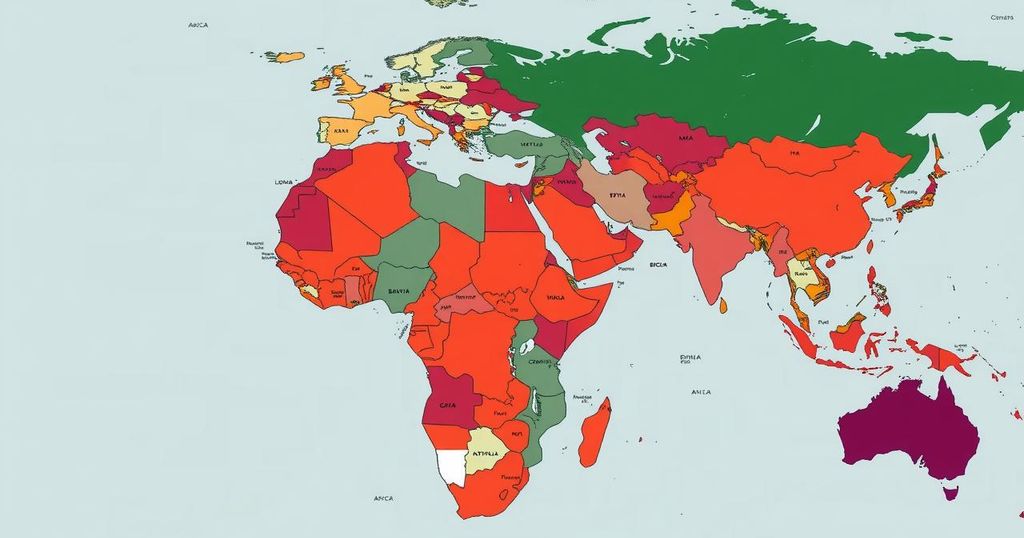Politics
” NUVUNGA, AFRICA, AMERICAN UNIVERSITY, AZALI ASSOUMANI, BOTSWANA, CENTER FOR DEMOCRACY AND HUMAN RIGHTS, COMOROS, CORRUPTION, DANIEL CHAPO, DEMOCRACY, DU, FRELIMO, GOVERNANCE, KWAKU NUAMAH, MAPUTO, MOZAMBIQUE, NAMIBIA, NUAMAH, OPPOSITION, SOUTH AFRICA, SOUTHERN AFRICA, SWAPO
Jamal Walker
0 Comments
2024 African Elections: Mixed Outcomes Amidst Political Turmoil and Progress
In 2024, several African nations held elections, resulting in varied outcomes for ruling parties. Some leaders retained power amidst allegations of electoral irregularities, while others faced surprising defeats. Notably, Botswana elected its first opposition leader in decades, and South Africa’s ANC lost its majority. Elections in the Sahel, however, were postponed amid military control, highlighting ongoing challenges in governance and democracy across the continent.
In 2024, voters across Africa participated in a series of significant elections that saw a mix of outcomes for ruling parties. Following decades of dominance, some incumbents managed to maintain their positions, while others suffered unexpected defeats, highlighting the volatile nature of the political landscape on the continent. Each election carried unique implications for governance, democracy, and socio-economic conditions in the respective nations.
The elections kicked off in Comoros, where President Azali Assoumani claimed victory for a fourth term under contested circumstances, leading to violent protests by the opposition. Meanwhile, Mozambique’s Frelimo party extended its lengthy rule despite allegations of electoral misconduct, with calls for unity in the aftermath of the vote. In Namibia, the ruling SWAPO party not only sustained its governance but also made a historic choice by electing its first female president, Netumbo Nandi-Ndaitwah, despite criticism of the electoral process.
In a watershed moment for the region, Botswana elected its first opposition leader in nearly six decades, marking a significant shift in its political narrative. This development contrasted sharply with South Africa, where the African National Congress (ANC) failed to secure an outright majority for the first time since the end of apartheid, prompting expectations for a coalition government.
Rwanda’s President Paul Kagame won nearly all votes, igniting debate over the true nature of his popularity amid allegations of restricted political freedoms. In West Africa, former President John Mahama’s return to power in Ghana underscores the electorate’s focus on the economy as a primary concern. Senegal experienced a historic moment when opposition figure Bassirou Diomaye Faye, became the country’s youngest president following a contentious electoral process.
The situation in the Sahel remains grim, with elections in Mali and Burkina Faso postponed amidst military rule, reflecting a concerning trend towards autocratic governance in that region. The context of these elections reveals not only the struggles for democracy but also the ongoing challenges of governance, accountability, and socio-economic stability across Africa.
The 2024 African elections occurred against a backdrop of historical political shifts, ongoing economic challenges, and the recent prevalence of coups in several regions. The elections spanned numerous countries, reflecting a diversity of governance structures, political tensions, and citizen concerns. The outcomes not only influence the internal political dynamics within each nation but also impact the broader regional stability and governance practices across the continent. By understanding these elections, we gain insight into the evolving African political landscape and the implications for future democratic processes.
In conclusion, the 2024 African elections showcased a complex tapestry of political outcomes across the continent, highlighting both continuities and changes in governance. While some ruling parties fortified their positions, important shifts occurred, as evidenced by the electoral victories in Botswana and Senegal. The varying responses from populations suggest a deep engagement with electoral processes and increasing demands for accountability, justice, and effective governance. The future of democracy in Africa will depend on how these nations navigate the challenges and opportunities that lie ahead.
Original Source: www.voanews.com




Post Comment